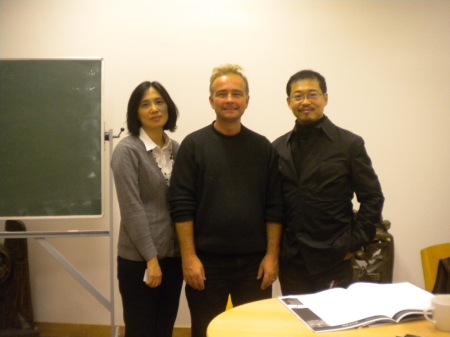
the noble
the nobel is stronger than china
china jumping up and down
on feet of clay
The situation is maddening for every serious literature critic who cannot acknowledge the encroachment of such a hyper-prize-situation on their territory. On the other hand, this is the perfect opportunity to see, and maybe even acknowledge, the impossible challenge of writing a balanced political or literature and art history of the last 100 years, or even 20 or 30. You could see the huge discrepancy between the international relevance of China and its surroundings and the impossibility for Chinese Studies (and Taiwan Studies etc.) of doing it justice in research, of reacting in adequate or satisfying ways. Actually, Anna Schonberg has found a convincing personal way of talking about Mo Yan’s work and the current debate. Goenawan Mohamad has written an article on Mo Yan and Yu Hua, seen from Indonesia. And Yang Jisheng’s investigation of the Great Leap famine is spawning documentary work in villages in the way of writing “people’s histories” in the People’s Republic. Howard Zinn’s People’s History of the US came out in 1979. China is catching up. There is Yang Xianhui, and there is 1942, a new film centered on famine, after the story Remember 1942 Liu Zhenyun wrote in 1992. But how relevant is literature on the whole?
Li Bai, China’s most famous poet, has been constructed as a would-be useful patriotic official in a recent play. I remember one or two other political readings of his poems. The political role of all literature and art that the CCP ostensibly demanded led to, or enforced overwhelmingly political reading of everything. Now Mo Yan cannot escape political criticism because he is a CCP official. He has written great literature. But because he got this larger-than-anything-even-China-in-a-way-prize, on one hand he can finally be a public intellectual, let his conscience speak and speak out for a return to reason in Chinese-Japanese relations and for a release of Liu Xiaobo, both taboo topics. A voice of reason after “street protests” against Japan (?), somehow evoking both Cultural Revolution and Fascism. Tolerated and stoked by a system in the midst of a supposedly tightly choreographed leadership transition. Leaders of the Bo Xilai generation installed. They’re different, of course.
Yang Jisheng in the international media is the perfect contrast, or antidote, to the 18th Party Congress spectacle. Another good contrast is running a detailed article on the One Child policy, like Die Zeit did. Speaking of family planning, Mo Yan’s Frogs is coming out soon in English and German. Granta magazine has an excerpt online.
Mo Yan spoke out, but he still was attacked because he didn’t speak out before, which is kind of unfair, because it would mean every writer has to be like Liao Yiwu, every artist like Ai Weiwei etc. The Nobel prize is very unique, because it entails so much international attention. And so especially societies with a huge inferiority complex, stemming at least in part from a rather recently constructed nation (as in Turkey) have to turn the recipient into an anointed emblem. The only alternative is to deny, like in Gao Xingjian’s case, that he/she belongs at all to the country he/she comes from and the language he/she wrote most of his/her works in, as Anne Sytske Keijser and Maghiel van Crevel have pointed out in a recent article in “De Groene Amsterdammer” (10/17/2012). In today’s China, for a virtual, fleeting audience online, you can show you are not part of this official face. Up to a point, that is. No mentioning of other recent Chinese Nobel laureates. But you can criticize Mo Yan, no matter if you have read his fiction or not. So anyone interested in freedom of speech has to be thankful to the Nobel prize and to Mo Yan for all the national and international attention they have generated. Mo Yan has chosen to speak out, so he should be respected. You can speak about your own impression of his work, as you should, according to Kant, if the question is “whether it is beautiful” (Critique of Judgement, Book 1). Or you can speak about your personal relationship with him and his work, as Howard Goldblatt has done. But you can also write about Mo Yan in a political light, which is what everybody has done, including me. Reading “Republic of Wine”, for example, both in Chinese and in translation, is much more rewarding.
The debate after Mo Yan won the Nobel is about debate. How much debate is allowed? How does debate get allowed or possible at all? It’s obedience vs. disobedience. What Charles Laughlin said on the MCLC list sounds like this: Demanding outspokenness from Mo Yan now is the same as demanding, in effect, obedience to the Party line in 1942. This is how it sounds like, not only to me, I am afraid. Obedience and disobedience are thus blurred. One-party systems enforce obedience and silence. Draconically, as the 8-year sentence on Oct.31 in Kunming of a young father of an unborn child for talking about a multi-party-system online shows. Multi-party systems include and tolerate traditions of disobedience. In some countries, civil disobedience is highly valued- think of Thoreau and Ghandi. Doesn’t mean these places are always better in every area and aspect.
Apart from Mo Yan and the Nobel subject discussed nobly or not, the New Statesman issue from Oct. 19-25 (guest-editor: Ai Weiwei) and the new issue of Words Without Borders provide worthwhile reading.






